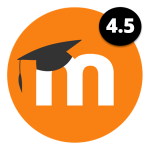Teaching & Learning Technologies
Moodle 4.5 Upgrade Rescheduled to August 12!

TLT, ITS, and Moodle US Support determined that some additional maintenance is necessary in order to ensure a successful upgrade. So as not to disrupt course preparation for Summer A 2025 term, TLT is working with Moodle US to reschedule the upgrade for Tuesday, August 12, immediately following the Summer B 2025 term and two weeks before the Fall 2025 semester.
Moodle 4.5 provides a number of feature enhancements while still maintaining a similar look and navigation to version 4.1. Learn More
The Teaching & Learning Technologies team leads efforts to strategically support the intentional integration of digital learning opportunities at Nazareth University, through training, development, and consultative course design for both faculty and staff. Connect with our team:
- through facilitated workshops with Nazareth faculty
- by request for small groups and academic departments
- by making an appointment
Professional Learning Opportunities for Faculty
- TLT's Summer 2025 Training & Workshops Catalog, to register for instructional sessions, all focusing on various subjects!
- TLT's Training & Workshop Playlist, for reviewing previously recorded sessions and video tutorials.
Technology Guide by Function
Content Delivery
-
Moodle is Nazareth's learning management system. It offers faculty a centralized point to share course content and facilitate virtual learning activities and assessments to students.
-
Google Workspace offers a multitude of applications, such as Docs, Slides, Sheets, etc., that can be integrated and shared through Moodle for a consistent learning experience for all students.
Digital Lecture
-
Echo360 is a comprehensive lecture capture and video hosting system that allows faculty to record video lectures for students to view at any time online. Transcripts are generated with each published video, ensuring equitable access for all students.
-
Zoom is our supported video conferencing tool, used to conduct synchronous, virtual class sessions, hold digital office hours, and to live-stream onsite classes to virtual students.
Virtual Learning & Collaboration
- Google Apps provide endless opportunities for virtual collaboration and resource development. Immersive Technology and Applications is a new way to incorporate digital learning into face-to-face and hybrid course designs.
- Qualtrics is a robust survey design tool available for all faculty and students at Nazareth. Explore research, data collection, and analysis in your course with this user-friendly platform.
- Support your students as they learn through technology. Info based Learning Cloud provides video training on programs like SPSS, iMovie, Excel which are easily embedded in a Moodle course.
Assessment
- Written work submitted to the assignment activity in Moodle can use Turnitin. This tool provides information to assist faculty in determining the originality of student work.
- Exams adapted for online delivery using the Moodle quiz activity can be required to use Respondus LockDown Browser and virtual monitoring. These secure testing measures can help to ensure academic integrity for online exams.
Tech Help for Faculty
Faculty Support Site
Discover our revamped Faculty Support Site, now with a clean, intuitive layout and quick-access guides for Moodle, Zoom, Google tools, Echo360, and more.
Need Assistance?
Submit a ticket using the Nazareth TeamDynamix Support Site to request help with any of our digital learning platforms, or email us directly at teachingtech@naz.edu.